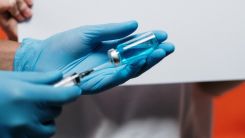
Isabella Beltran


CRISPR: Improving Methods of Gene Function Studies

Prehistoric Pigments: How Melanin Shaped Avian and Mammalian Evolution

Why Coral Reefs Turn White? Science Explains
How Can Sea Cucumber Poop Revitalize Coral Reefs?
Why Do Some Rocks on Earth Turn Red? Scientists Explain

Why It's Important to Keep Running as You Age? It Benefits Your DNA

Did COVID-19 Vaccine Recipients Develop a Rare Blood Disorder?

Background Noise in the Brain May Be the Key to Age-Old Mysteries
SpaceX Starship SN10 Raptor Engines Installed Prior to Testing and Landing Attempt

How the Galveston Bay Foundation Turns Scrap Oyster Shells into Treasures
Manipulative Animals: How Some Species Use Blackmail

Why Do We See Colors Differently?

Why Do We Avoid Breakups? Science Explains

Insecticides: Is It a Threat for Mammals?
Does Space Travel Damage the Powerhouse of the Cell?
New Research Shows That Fungi in the Gut Helps Immune System Fight off Infection

New Report Says Breast Cancer is the Most Diagnosed Cancer Across the Globe
Anthropogenic Noise in the Ocean Is Disrupting Marine Life

Are Plants Conscious?
Can A Single Altered Gene Turn Fish Fins into Limbs?

Elephant Evolution: Why the Biggest Pachyderms are Big and Resistant to Cancer?
Echolocation: Nature's Built-in GPS
Chimpanzee-Killing Disease Linked by Researchers to New Species of Bacterium
Scientists Study Einsteinium, Debris of Nuke Tests in the 50s

Scientists Unravel Unexplained Martian Activity

Gut Microbiomes: How Does it Affect Brain Health?
Capybaras: Everyone's Favorite Dog-Sized Rodent

Could One Age Group Be Responsible for Almost Half of New Cases of COVID-19?
Fusion Rocket Thruster: A Concept Developed By a Female Physicists that Could Send Us to Mars
Most Popular

Can the World Run Out of Water? Water Scarcity Science and Climate Impact Explained

Solar Maximum 2026: Inside the Sunspot Cycle and Solar Activity Forecast Astronomers Are Watching

Volcanic Warning Signs: How Magma Movement Reveals Eruption Prediction Clues for Geologists

Could Technology Prevent Natural Disasters? How Disaster Prediction and Early Warning Systems Could Save Lives




